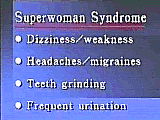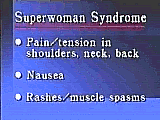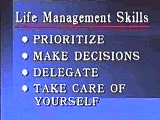Superwoman Syndrome
The superwoman syndrome … it doesn’t mean you’re jumping off high buildings with a simple leap, more likely it’s a woman trying to do it all. Today the superwoman syndrome affects women of all ages, career stages and economic levels. Many times the woman herself is unaware of the stress in her life until she begins to have health problems. 
Marjorie Hansen Shaevitz and her husband Mort are nationally known for their work at the Institute for Family and Work Relationships. Hansen has written the bestselling book the Superwoman Syndrome — a syndrome that leaves women with serious health consequences.
Marjorie Hansen Shaevitz, Book Author: “They’re doing everything from the time they wake up in the morning until they fall exhausted into bed at night and they’re experiencing physical symptoms.”
 What is the most common physical symptom of being a superwoman? It’s fatigue, but we’re talking about an exhaustion much more than just being tired. Other symptoms include: feeling dizzy or weak, headaches including migraines, grinding your teeth, frequent urination, pain or tension in the shoulders, neck or back, nausea, rashes and muscle spasms.
What is the most common physical symptom of being a superwoman? It’s fatigue, but we’re talking about an exhaustion much more than just being tired. Other symptoms include: feeling dizzy or weak, headaches including migraines, grinding your teeth, frequent urination, pain or tension in the shoulders, neck or back, nausea, rashes and muscle spasms.
Mort Schaevitz: “Nobody can keep going 18 hours a day, 7 days a week. And if you try to do it eventually something will break down. For women, very often the only legitimate reason for them to say no is when they have a diagnosis from a physician that says you are sick.”
What can you do to better manage your life and avoid health problems? Prioritize — know what your priorities are. Decision making — you make the calls. Delegating — don’t take on everything. Lastly, take care of yourself. This last one can make the difference of health or illness.
 Anyone can suffer from superwoman syndrome. A single woman or even a grandmother can be affected … the key is to realize this only becomes a problem when health problems pop up.
Anyone can suffer from superwoman syndrome. A single woman or even a grandmother can be affected … the key is to realize this only becomes a problem when health problems pop up.

